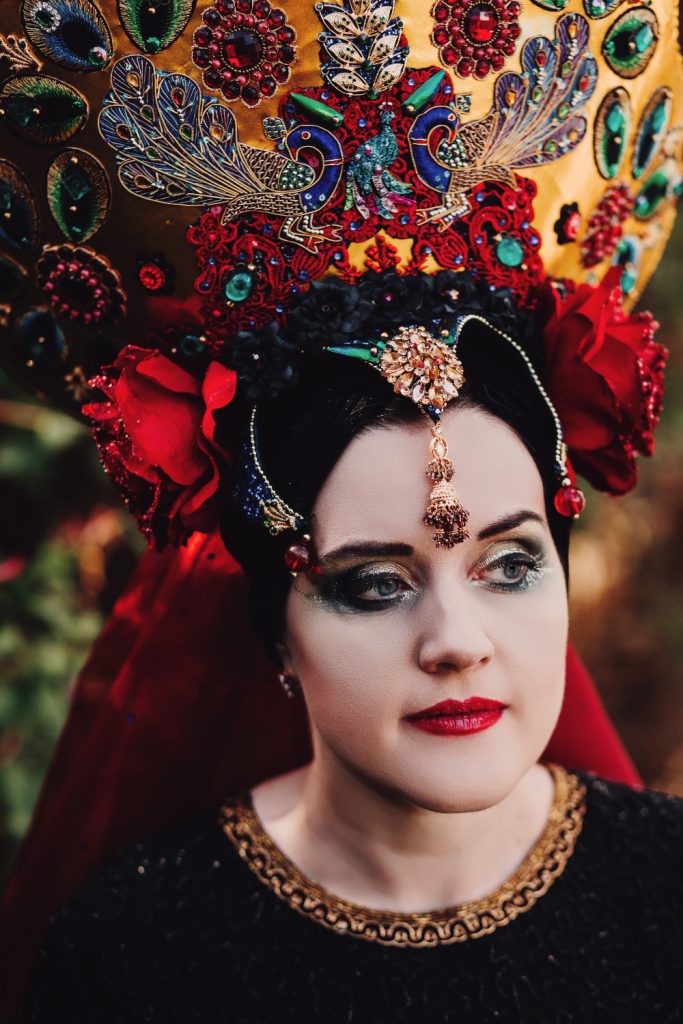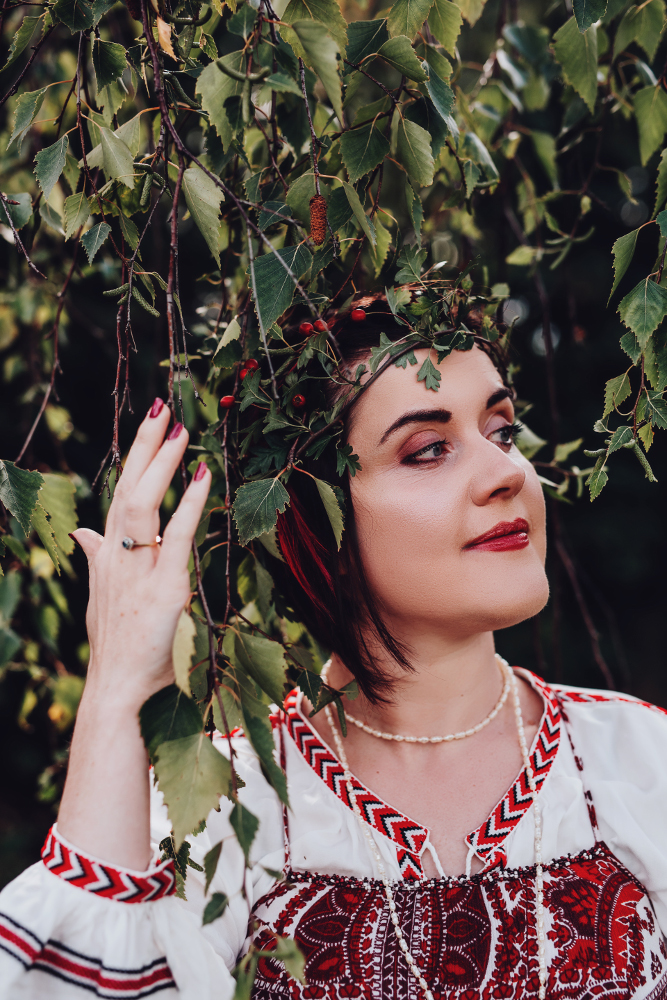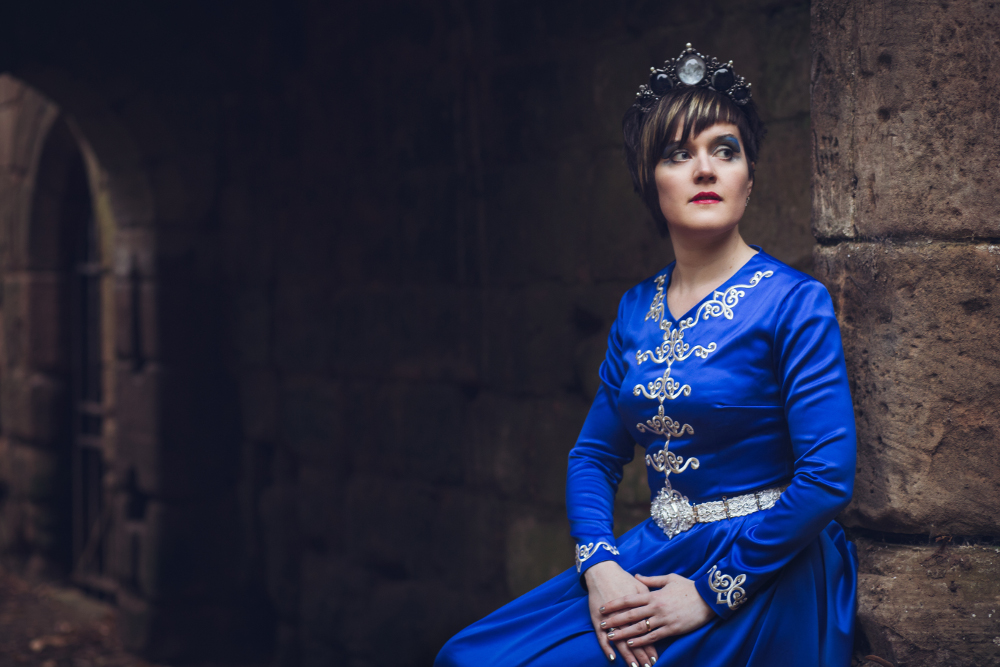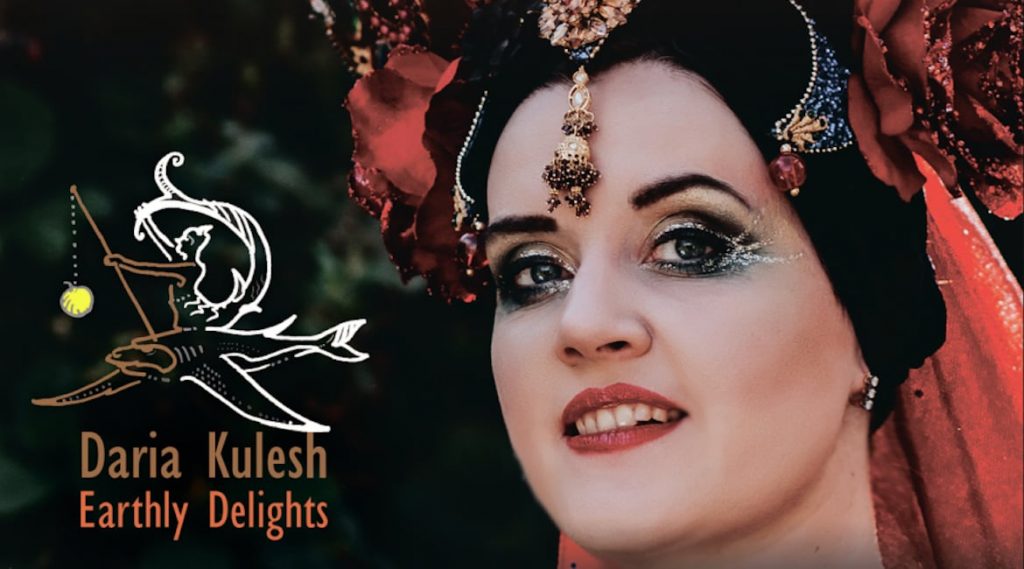Who is Daria Kulesh?

In the middle of last year, I received an email from Daria Kulseh, who has been given my details by the wonderful Elfin Bow. She described her music to me as “a bold fusion of cultures and styles – my Russian and Ingush (see: North Caucasus) heritage is mixed with English and Celtic folk influences, unique and rich family history and a turbulent journey through life. Storytelling plays a crucial part in my songwriting and live performances. True life tales are intertwined with folklore and magic.” I was incredibly intrigued by this and soon fell in love with her album ‘Earthly Delights’. We became friends on Facebook, as a way of keeping in touch, and then two weeks ago I realized she had posted a video of her performing live at home – I’d missed the event due to it being the middle of the night in NZ when it was originally aired. I watched the event and was blown away by it, so much so that Daria and I were soon swapping messages, and I wondered if perhaps she might like to undertake an interview? The result is one of the favorite pieces I have ever been involved with, as Daria has an incredible story to tell, and this knowledge helps bring her songs even more to life. She is an amazing talent, and hopefully, this interview will inspire you to seek her out for yourself.
Who, what and when is Daria Kulesh?
Daria Kulesh is an extremely split personality! My identity is a crazy cocktail of Russian, English and Ingush. Moscow, Russia is where I was born and grew up – so that’s my native heritage, my fond childhood memories and adolescent adventures. England is my adopted home, where I became a wife and a mother; found my path as a performing artist and my language as a songwriter. Ingushetia in the North Caucasus is my Grandmother’s long-lost home, a land that has always fascinated and summoned me – first from a safe distance; but then I answered the call and my life has never been the same. The story and spirit of the Ingush people, their tragic and unique fate, the severe, primordial beauty of their mountains are the lifeblood of my inspiration. Up there, in the mountains, time flows differently – you can hear the voices of the ancestors in the wind, and stories that unfolded in ancient legends feel as real, recent and routine as a cup of coffee you had in the morning. Up there, the soil and the sky meet and intermingle, the past bleeds into the future, the boundaries between myth and history are blurred, and magic is commonplace.
In the words of the Ingush poet Ali Khashagulgov:
Where icy summits ring so clear,
Their voices can be heard –
No earthly soil they’re ploughing here,
But heaven’s fields are stirred.
Their heavy ploughs are pulled by clouds,
Their furrows are of smoke,
The sun, with ever watchful eyes,
Observes their constant work.
They sow no earthly seeds, but stars!
Throw handfuls in the air…
A song of love the starling starts,
The tune is pure and fair.
Of spring it sings, of hope it sighs,
Of faith in days ahead…
Those who can’t see these simple signs
Are deader than the dead
(Translated by Daria Kulesh)

What are your earliest musical memories and who/what inspired you to start playing music?
I was a very geeky child, an academic achiever, but with what felt like too many strings to my bow. I wasn’t sure whether I preferred art and craft, or poetry, or languages. A Jack of all trades, I had no idea which one to try and master. What I really wanted was to be good at the one thing that seemed completely out of reach – music. Music was my unrequited passion – as a young child, I would sit, silent and spellbound, through classical recitals. My Mum soon discovered that the best way of getting me to behave was the threat of binning concert tickets. Yet, my dream of becoming a violinist had been dashed – aged five, I auditioned for a music school and the verdict was pretty damning. I was pronounced a profoundly tone-deaf no-hoper. In the rigid Soviet system that favored child prodigies nobody wanted to give me a second chance. Despite this brutal reality check, the impossible dream proved too hard to kill – and one night, aged something like eleven, I made a wish before going to sleep: to become good at music. At the cost of all my other skills and strengths, if necessary. Not that I woke up with a coloratura soprano the very next morning, but a couple of years down the line, I randomly picked up a leaflet on the underground – a concert featuring some Scottish folk musicians, that same evening. Out of pure curiosity, I went along. And ended up besotted, not just with the haunting melodies, but with the sheer joy and fun of the performances. Very different from the strait-laced classical world I’d known. I dived into learning all these wonderful Celtic songs and singing them at house parties. People started giving me compliments – at first, I thought they were joking! One thing led to another, and at the age of 18, I became the resident singer at one of Moscow’s Irish pubs, with a backing band of Conservatoire students. I guess I got the job mostly because of my lack of a heavy Russian accent! With a couple of line-up changes, the band had an exciting journey including some TV appearances and performances for the UK Embassy and the British Council. I even ended up lending my tartan outfit to the Russian pop star Glukoza to record her MTV Video Music Awards acceptance speech – the ceremony she couldn’t attend was held in Edinburgh that year.
Anyway, long story short, back in Russia I was merely a singer. And an active, published and performing, poet. Playing instruments and writing songs came much, much later: my first instrument was a bodhran bought in Nova Scotia, along with a tin whistle (which I’ve never practiced enough!); then years later, in England, I discovered first the guitar, urged by a friend – which, to my complete amazement, suddenly enabled me to write tunes and songs – and then the Shruti box, inspired by seeing Maz O’Connor perform. At the moment I’m using the quarantine to practice some other instruments that people have kindly gifted me over the years – the Appalachian dulcimer and the Kazakh dombra, plus the far less exotic piano keyboard and loop pedal. On my recent home live performances, you will also see me playing the Shruti box, aka “squeezy suitcase” (as described by one of my younger audience members). I bought it on eBay for £75 and it was delivered all the way from India!
Your grandmother was obviously a huge inspiration in many ways, please tell us about some of the stories she told you which you later turned into songs.
Her most important story was of her own parents, Diba Posheva and Rashid-Bek Akhriev, the Moon and the Pilot, and of her people’s deportation by Joseph Stalin on 23rd February 1944. It’s a story that combines beauty and stoic heroism with unspeakable brutality, it’s a story of sacrifice and horrific injustice – but ultimately, of love that can’t be killed, of the human spirit that can’t be broken. When I perform live (used to perform live? Crazy times!), I share with my audience an album of precious family photographs kept by my grandmother. While she was alive, she never showed them to me, I didn’t even know they’d existed. But after she passed away, she left me a sealed package. When I opened it, all the people from her stories sprung back to vivid life. Her descriptions of them were so extraordinary, I knew instantly who everyone was… Her mother, the Moon, a beauty with luminous snow-white skin framed by the blackness of her hair. Her father, the heroic Pilot with sad, mild, knowing eyes. Her own grandmother, proud and prim, solid and sharp, like an ancestral stone tower – the wise matriarch who speaks up in defense of her daughter’s unorthodox choice of a husband and wins, with pure elegance and common sense, against prejudice and conservatism. Her Uncle, the gentleman doctor, the brilliant dancer – grace and steel combined, seemingly immune, in his unshakeable nobility, to the ugliness and cruelty of the world. It felt like being struck by lightning, I was electrified, set alight – songs just came pouring out… “The Moon and the Pilot”, “The Hazel Tree”, “Like a God”, “Safely Wed”, “Only Begun” – all of these songs on my ‘Long Lost Home’ album are rooted in my grandmother’s stories.
I’m a little intrigued that you are a published poet. Were you writing about Ingushetia back then as well?
I was indeed as that was a way of coping with my grandmother’s passing… A few of my songs – “Safely Wed”, “Fata Morgana”, “The Hazel Tree”, “Only Begun” – are based on earlier Russian poems. Being fully aware of my grandmother’s illness for years – in fact, all the time I got to spend with her was borrowed time – I knew how precious her memories were and kept writing everything down. Not just the bare bones of the stories, but all the witty little phrases and metaphors and the vivid images they evoked. The main difference between the earlier poems and the later songs is the viewpoint which informs the tone. The poems were penned by a curious outsider, sometimes perplexed by the “exotic” culture; years later, the songs carry a sense of belonging, a much deeper understanding, and respect.
So how come you ended up in the UK?
In 2006, I was employed by a Russian luxury lifestyle magazine as a travel writer and sent to the UK on the hunt for stories. Music and poetry weren’t my livelihood at the time, in Russia one was expected to have a “real job” and I’d chosen my career quite early on, volunteering and working for various young people’s publications since I was 13. Once in the UK, I traveled to beauty spots and cultural landmarks, interviewed museum and theatre directors, writers, artists, and performers. One of the most glamorous perks of the job was reviewing upmarket hotels and restaurants… as well as folk festivals! (the latter was my idea, obviously) There was a sinister side to this world of luxury, too, as reflected in my song Fake Wonderland. Also, when the magazine started running into serious financial difficulty and my wages evaporated, some situations I found myself in were deliciously absurd – for example, flying with Ryanair to a 5-day luxury fam trip of Scotland with a tiny bag, and wearing most of my clothes in ridiculous cabbage layers – I was due to stay at The Balmoral and Gleneagles, yet paying an excess baggage fee would have meant genuine financial trouble. In the middle of this crazy penniless life of occasional ultra-luxury, I met my future husband, and the rest is history.
What did you think of the UK music scene when you arrived, and how did you get involved in it?
I had absolutely no clue how things worked and had to start completely from scratch… Open mics were great fun but didn’t really lead to anything – my goal wasn’t necessarily to make any money, but to find musicians to play with. At the time, I couldn’t play any instruments and hadn’t written any songs apart from some lyrics to other people’s tunes. So, I gave folk clubs a try, and at first, got a few things terribly wrong – such as bringing backing tracks to sing along to. I did the odd pub gig with local musician friends I made along the way, singing either Irish songs or an embarrassing selection of covers. Slowly but surely though, having picked up a couple of guitar chords, I started writing songs, finding my way on the folk scene and getting feedback, both encouraging and constructive. It was at Uxbridge Folk Club that Archie, the organizer, played the musical matchmaker and, in a stroke of mad genius, introduced me to my first UK band, KARA. The band ended up developing a very original Anglo-Russian sound, made even more exotic by the combination of accordion and hammered dulcimer, and our debut album was acclaimed by The Telegraph and bootlegged by Amazon… Also, in a quirk of fate, I presented a show called Folk DJ on a local community radio station, and that was a great way of meeting people for interviews and live sessions as well as listening to loads of records and generally getting quite immersed into the scene. Generally, I found the folk community very friendly and family-like, the main difference with Russia is that if you see your music journey (or “career” if you like, although I’m not a fan of the word) as a ladder, in the UK you can slowly climb from the ground up to a considerable height. In Russia, you can make it as far as the first couple of steps and then there’s a void, the middle rungs are missing… to go any higher, you usually need a helicopter lift – a huge cash injection which can only come from an ultra-rich sponsor/benefactor. I feel very grateful for the way the UK folk scene is set up in such a welcoming, informal way, surrounded and nurtured by an amazing community of music appreciators.
Did working with Kara lead directly to your first solo album, ‘Eternal Child’? Looking back on it from five years, how would you describe it now?

‘Eternal Child’ felt like a vanity project, a selection of very confessional, unashamedly revealing stories, and I was blown away by the response to it. I had been worried that the thoughts and sentiments expressed in the album were too personal and quirky to mean anything at all to other people. It was released in contrast to the theatrical, dramatic, make-believe, over-the-top realm of KARA – which I’d thought had a much broader appeal.
I would describe it as a “twilight” album, compared to ‘Long Lost Home’’s moonlit darkness and ‘Earthly Delights’’ bright sunrise. Back then, I found inspiration in the shadows and was one of those artists who feel they can’t write happy songs. Also, Eternal Child was therapy – at the time I was giving up on the idea of motherhood (or so I thought!) and coming to terms with it. I embraced being different from most people, looked at the world with the eyes of a child who will never grow up, clinging on to the echoes of lost innocence, shadowy memories, and dreams. Yet there were some things that I saw very clearly, such as human weaknesses and fakeness. One should be very careful around children – they are watching us, understanding a lot more than we realize. And some children grow up to be singer-songwriters…
Five years later, I’m looking back at ‘Eternal Child’ and realize that I have, somehow, grown-up. Yet I do miss being that child, too.
The second album, ‘Long Lost Home’, has a real back story to it, how did it come about?
It all started with one song – “The Moon and the Pilot”, a song that wrote itself in a matter of minutes and took me on a whirlwind journey – first, to the studios of BBC World Service and from there, unexpectedly, to my grandmother’s lost homeland of Ingushetia. The BBC World Service broadcast was seen by my grandmother’s nephew, the son of her estranged brother, and him reaching out to me was the first, mind-blowing step toward rebuilding burnt family bridges. Then, also on the back of that fateful broadcast, I was officially invited to visit Ingushetia by Rustam Tarkoev, who became my guide, host, and advisor and also introduced me to the incredible Timur Dzeytov, then People’s Artist of Ingushetia and now its Minister of Culture. The strange thing about that visit was my sudden celebrity status, the TV talk shows and the audiences with politicians – yet, as much as most people were very keen to give me the most glamorous impression of life in my grandmother’s native land, I saw enough of the truth, heard enough of the real stories. The generosity and warmth of the people – despite their often tragic, sometimes horrifying life stories – was deeply humbling, and their love of life infectious. I was also completely awestruck by the beauty of the mountains and the towers. Finally, I arrived on the soil of my grandmother’s ancestral nest and felt such a deep, blissfully aching sense of belonging, as if my feet were growing roots. I felt grounded, no longer the fleeting spirit, Peter Pan, the Eternal Child. The Ingush word for happiness – “iraz” – means, literally, a plot of land. I have found mine.
After that journey, some songs got changed and enhanced. Some got written from scratch. And for certain, Long Lost Home would not have been the same had I not found it…
Your most recent album, ‘Earthly Delights’, was released in 2019 and you describe it as “Bright sunrise”. When I reviewed it I said that it was “Simply awesome… an album which should be in every music lover’s collection“. How would you describe it to someone who hasn’t heard it? Take us through the songs.

‘Earthly Delights’ is a celebration – fun and upbeat, whimsical and mischievous. It’s a grateful and playful exploration of human nature; of love, desire, ambition and other urges that drive us, both physical and spiritual. It retells and twists fairy tales, episodes from history, urban legends – rich old stories that are timeless, ever-relevant and relatable. “Great battles of love and life” that we all live through, every day. If I can make my listeners gasp: “That Russian fairytale – wow, feels as if it’s all happened to me!” – then my work is done. A review in FATEA Magazine says that my songs “aren’t just sung, but lived”. When I perform, I become the characters in my songs. I tell the stories by living them.
To recoup my journey as a songwriter and storyteller, ‘Eternal Child’ was a surprisingly well-received very private, very confessional album from a time when I was still figuring out my path, my place in life. Back then, darker stories seemed more appealing and nuanced, more interesting to explore as a detached, childlike observer. Having matured through the making of my second album ‘Long Lost Home’ – a life-changing journey to my Grandmother’s homeland of Ingushetia in the Caucasus that opened my eyes and my heart – I was handed the great responsibility of telling stories that really mattered. People’s reactions to my song “The Moon and the Pilot” in particular have been incredible and humbling. Music no longer felt like a self-indulgent vanity project. I had something to offer that people truly wanted and needed. Also, my vision has changed – now my inspiration doesn’t just live in dark places; the new songs are full of light, shade, and color. Of lust for life. One of the covers on the album – “Quiet Joys of Brotherhood” – reflects and embraces my deep belief that “love is lord of all”, an ever-present force, like gravity, that connects all living things. And the penultimate song, “Made of Light”, claims that the more love we leave behind in the world, the longer we live on.
From a completely different angle, “Shame or Glory” is another song inspired by the current stage of my journey, by this new understanding and maturity, by the sheer joy and fulfillment I’ve discovered in my art – regardless of any competitive aspects, any awards or other forms of formal recognition. While singing songs and telling stories is a reward in itself; while you feel like you simply can’t be doing anything else – nothing else matters! And in that, all truly possessed artistic souls are united in a brotherhood of holy fools – whether you are the ridiculed William McGonagall or the revered Vincent van Gogh.
Also, ‘Earthly Delights’ is deeply rooted in my native language, the emotional landscape of my culture, the old stories that I was told and read as a child, such as the tales of Vasilisa and Morozko – all of that is at the core of who I am. I have grown many cultural and linguistic layers, and my music is a fusion of many influences, described by some as an “ambitious culture clash” – but underneath all that, my native background is the soil from which all these fanciful flowers and strange fruit grow. Interestingly, on the new album, I have a W.B. Yeats poem, set to music by Joseph Sobol – “Cap and Bells”. The reason I picked that song is because it echoes the familiar plot of a classic Russian novel, which in turn is based on a powerful true story.
My favorite song on the album is probably “Golden Apples”, It’s such a fun, playful song to perform, and I have fond memories of fleshing out the arrangement with the supremely talented Jonny Dyer during a wonderful tour of Scotland in October 2018. It’s written from the point of view of a magical, whimsical creature – the Firebird of Russian folklore. She represents – to me – pure unchained desire, pleasure without consequence. She flies into the Tsar’s garden at night to steal, uncaught and unpunished, his most precious treasure – the magical golden apples. The Tsar sends his sons to catch the mystery thief; but the Firebird’s enchantment sends them into a deep sleep, night after night. From the Firebird’s uncluttered perspective, what’s the point of all that effort to guard something you possess, but never dare to enjoy? We all have hungry Firebirds held captive in our ribcages, desires we will never release, perhaps not even confess to. If we were to release them, all at once, the world would catch alight!
The whole album is full of complex, often ambivalent characters – the seductive and childlike Rusalka, who turns a pious old monk’s world upside down; the brave and ruthless Vasilisa, who becomes a queen at a considerable moral cost. Most of the songs on ‘Earthly Delights’ can be described as “morality tales” – no wonder that several of the songs – “Pride of Petravore”, “Greedy King” – have deadly sins in their titles. Yet, the rigid biblical framework of virtue and sin is shaken and stirred by the pure, pagan lust for life and enjoyment of everything this world has to offer. In “Greedy King”, the moral of the story is that shameless, primal, indestructible joy can be found down the deepest well of despair, and that’s how life triumphs over death itself. And the title track encourages you to:
Be greedy – for joy!
Be lusty – for life!
Be proud – of what makes you stand tall.
No deadlier sin
Than a heart without love.
Feed your fire,
Sing the song of your soul!
Since leaving Moscow you have flourished as a performer, become a wife and a mother, and investigated your grandmother’s heritage among other things. What is next (after the current situation)?
After my very short maternity leave, I found so much new joy in performing and uncovering previously unseen layers and meanings in my existing material. It felt like I was connecting with my audiences on a whole new level. I’ve also incorporated some new songs, such as tender, exquisite traditional lullabies and a couple of covers. My own writing, however, has been dormant – but that’s not a worry. I’m finding a lot of magic, inspiration, and nourishment in motherhood, but it will take time to distill these new discoveries into songs, it’s a natural process, a necessary pause as I’m adjusting to a new way of being, of rediscovering the world through my daughter’s eyes. I can’t wait to be performing live again though as before the lockdown it felt better than ever this year, totally exhilarating – even more so, I can’t wait to collaborate with my amazing musician friends in various duo and trio outfits, and in exciting projects such as Joseph Sobol’s incredible “folk opera” based on the life and poetry of W.B. Yeats.
Meanwhile, here is a quote that really resonates at the moment, as I gaze upon the slowed-down world with a mix of childlike wonder and giddy gratitude for the joy and beauty of nature. In the words of Ali Khashagulgov, as he returned to Ingushetia, his homeland, after long years of exile:
“Woodpeckers are drumming on the tree trunks, dropping dust onto the ground. I am drunk, Homeland, drunk with my love for you! You alone are in my thoughts, I dreamed so tirelessly about you from a distance. And now I’m wandering in your woods, like a madman… My heart is pounding; it is glad – like a cuckoo that’s broken free from the human grip. Every berry-laden branch of the viburnum shrub is like a blushing bride. And the spider among elderberry leaves is weaving me a white scarf with silver threads. I am giddy with its aroma! The sun ripens a sweet red apple, caressing it, cheek-to-cheek, and cornel berries are like embers in my mouth …How I love all of this! I am keen to kneel before your every tree, as I would before a priest. In foreign lands, so long have I dreamed of seeing you! And now woodpeckers are drumming on the tree trunks, greeting me after a long separation.”
(Translated by Daria Kulesh)
Where can people find out more information, purchase your music, or watch your home concerts?
My website – www.daria-kulesh.co.uk – is quite busy and informative, do take a peek! Discover my music and art, learn more about Ingushetia, connect with my social media pages, and even watch my online home concerts (via the links on the Gigs page). And when we can gather again to celebrate the magic of songs and stories, I very much hope to meet you in the real world!
Interview conducted by Kev Rowland

